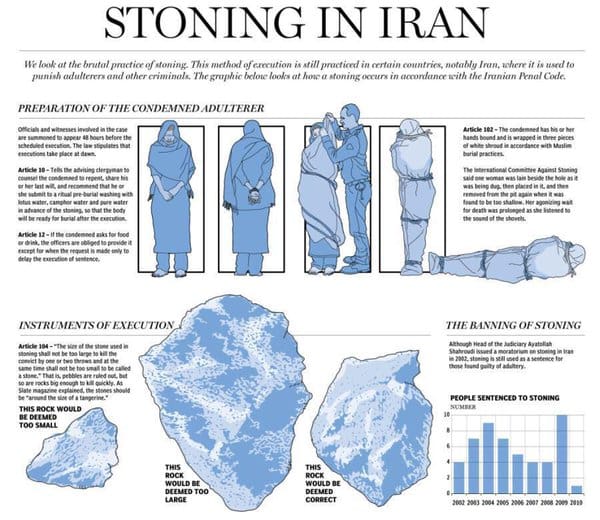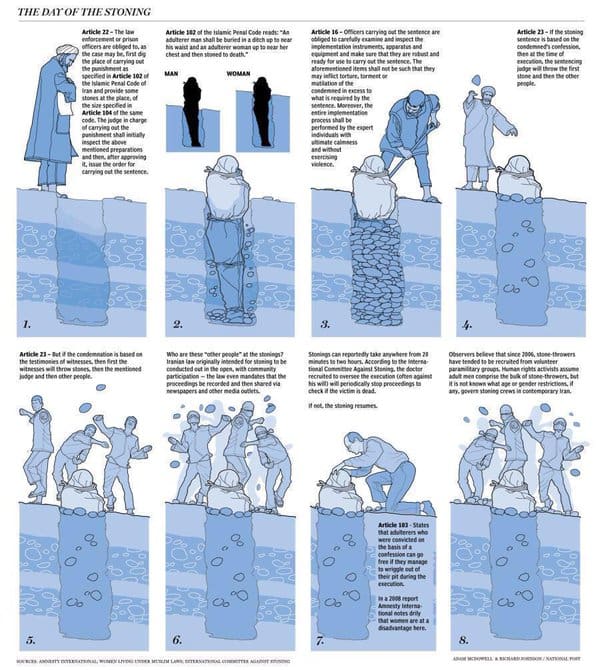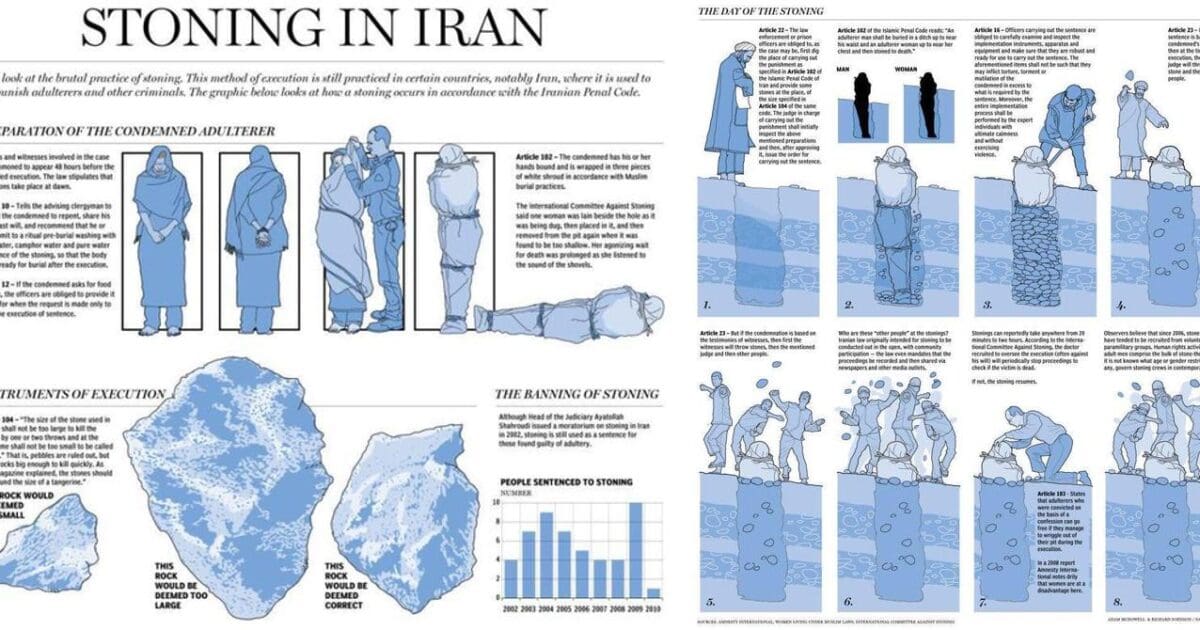Stoning in Iran is not the result of “archaic interpretations” or “cultural misunderstandings”—it is Islamic law in action. Codified in Iran’s Islamic Penal Code and justified by Sharia, stoning stands as a grotesque example of what happens when a legal system is based on Islamic doctrines. This inhumane punishment, primarily targeting women, epitomizes the brutality of Islamic law and its incompatibility with basic human rights.
Stoning: Institutionalized Torture Under Islam
Under Iranian Islamic law, stoning is the punishment for adultery committed by married individuals. The Penal Code prescribes this barbaric method of execution, specifying that stones used should be large enough to cause pain but not so large as to kill the person immediately—ensuring a slow and excruciating death.
The victim is buried—men to the waist and women to the chest—before the public hurls stones at them until they die. This is not a cultural aberration; it is Islam, explicitly upheld by Iranian authorities as divine justice.


While a supposed “moratorium” on stoning was announced in 2002, this punishment remains codified in Iran’s legal framework. The 2013 revisions to the Penal Code retained stoning, allowing for alternative executions only if stoning was deemed “impractical.” This empty concession merely masks the continued barbarity of Islamic law.
Though the frequency of stoning executions has decreased in recent years due to international scrutiny, the practice is still legally sanctioned in Iran, leaving the door open for its continued use.
Systematic Oppression of Women
Under Islam, women bear the brunt of stoning sentences. Islamic law is inherently discriminatory, treating women as inferior in both testimony and status. In adultery cases, a woman’s testimony is nearly worthless unless corroborated by male witnesses. Meanwhile, men accused of adultery can often escape punishment by exploiting Islamic provisions like temporary marriages (sigheh), a loophole that allows sexual relationships under the guise of religion.
Even during stoning, women are buried deeper than men, making their escape virtually impossible. This cruel disparity highlights the systemic misogyny baked into Islamic law, where women are punished not only for alleged crimes but also for their existence in a male-dominated society.
Islamic Law: A System of Barbarity
Stoning is not an aberration—it is an inherent part of Islamic law as implemented in Iran. Those who defend Islam’s “justice” system claim it is divine and unchangeable. Yet, its practices—like stoning—violate every modern principle of justice and human dignity. Iran’s legal system, rooted in Sharia, is a testament to how the Islamic “religion” is weaponized to oppress, torture, and kill.
Adultery, a private matter, becomes a death sentence under Islam. Convictions can be based on coerced confessions, dubious witnesses, or the judgment of biased religious courts. Women are disproportionately targeted, reflecting Islam’s deep-seated misogyny and patriarchal control.














This “Tutorial for Stoning Females According to Islamic Law” must immediately be implemented also in EU says Ayatollah Urine von der Leyen.
A wonderful new law for the new MU, Muslimshit Union , formerly EU !
“The View’ co-host Whoopi Goldberg says Musk is Trump’s ‘actual vice president’ and should give up X”
PLEEEAAASEEEE! THROW THAT IDIOT WHOOPING COUGH FOR LIFE IN SOME MENTAL INSTITUTION IMMEDIATELY!
DISGUSTING STUPID UGLY WITCH BITCH!
“Denver Mayor Mike Johnston says Trump’s mass migrant deportations will create ‘Tiananmen Square moment’
Denver Mayor Mike Johnston pledged to resist President-elect Trump’s proposed immigration policies”
TOM HOMAN, THROW IMMEDIATELY THIS TERRORIST MIKE JOHNSTON IN JAIL FOR LIFE!
“Biden administration informs Congress it will forgive $5B in economic loans to Ukraine
Congress passed a funding package that earmarked $60B for Ukraine in April”
THE TERRORIST ZELENSKY MUST RETURN ALL THE STOLEN BILLIONS OF DOLLARS!
BIDEN’S & HARRI’S AND ALL DEMOCRATS ASSETS MUST BE SEIZED IMMEDIATELY AND COLLECTED AS PAYMENTS FOR THESE LOANS!
ALL DEMOCRATS HOMES MUST BE SEIZED AND SOLD. ALL DEMOCRATS CAN LIVE IN TENTS, THAT’S ENOUGH FOR THEM AND A PUNISHMENT FOR DESTROYING AMERICA!
ISLAM IS A MENTAL ILLNESS!
“Using this land for deportation purposes is just part of a multitude of strategies that we’re involved in,” Gov. Greg Abbott, R-Texas, told “America’s Newsroom” on Wednesday.
“One is, as we speak right now, there are more orange buoys that are being put into the Rio Grande River to deny illegal entry. The second thing is we are working to make sure that we are going after the criminals… That’s why I declared Tren de Aragua as a foreign terrorist organization, so that we would be able to muster every single law enforcement tool in the state of Texas to go after them and arrest them. ”
OK, BUT EU, WHO, NATO & WEF ARE ALSO TERRORIST ORGANIZATIONS AND THEIR LEADERS AND MEMBERS ARE TERRORISTS. WHY ARE THEY NOT ARRESTED?
IMMEDIATELY ARREST AND HANG: URINE VON DER LEYEN, MACRON, SCHOLZ, MERKEL, MARIN, SCHWAB, HARARI, GHEBREYESUS, FAUCI, GATES, STUBB, ZELENSKY, etc.